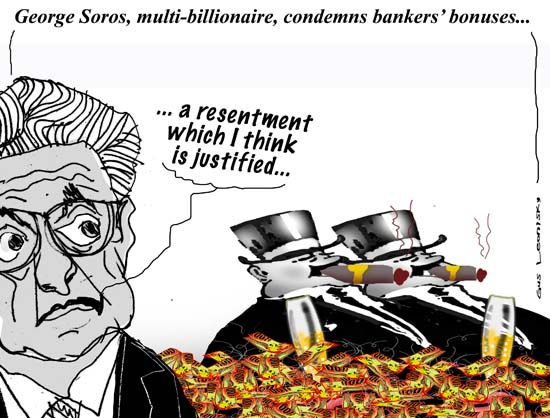Search
Recent comments
- conspiracy....
17 hours 29 min ago - brutal USA....
19 hours 25 min ago - men....
19 hours 46 min ago - oil....
20 hours 22 min ago - system....
21 hours 9 min ago - not invited....
21 hours 44 min ago - whistleblow.....
1 day 11 hours ago - demosocialism....
1 day 20 hours ago - front cover up....
1 day 20 hours ago - the trick....
2 days 7 hours ago
Democracy Links
Member's Off-site Blogs
the fortune tellers....

George Soros became the latest high-profile figure from the world of finance to condemn the bankers, and call for watertight restrictions on their activities yesterday. He said: "Banks are actually getting hidden subsidies of enormous amounts because of their ability to borrow at effectively zero, and buy 10-year government bonds at 3.5 per cent. So those earnings are not the achievement of risk-takers. These are gifts, hidden gifts, from the Government, so I don't think those monies should be used to pay bonuses. So there's a resentment which I think is justified."
And, as increasing numbers wonder why the United States' decisive action to cap bonuses in firms taking public money has not been matched in Britain, there are now signs of a hardening of attitudes towards bankers inside the City. The Square Mile grandee Sir David Walker, The Independent on Sunday understands, is now expected to call for them to be banned from paying guaranteed bonuses in his forthcoming report on corporate governance. He is believed to have been impressed by the growing acceptance among big institutional investors, and even the banks themselves, that paying out huge salaries and bonuses may have exacerbated and contributed to the banking crisis. One source said: "Everyone knows the levels of bonuses are quite insane. None of the banks dare break ranks and stop paying such big bonuses because they are frightened traders will jump ship to another bank, or overseas. That's why many actually want to be told what to do."
- By Gus Leonisky at 25 Oct 2009 - 3:45pm
- Gus Leonisky's blog
- Login or register to post comments
loaded, philanthropic and anti-bush...
George Soros (Hungarian: [ˈʃoroʃ]) (born August 12, 1930, as György Schwartz) is an American currency speculator, stock investor, businessman, philanthropist, and political activist.[2]
Forbes lists Soros as the 29th-richest person in the world, with a net worth estimated at US$11.0 billion. Soros has given $6 billion to various causes since 1979.[1]
Soros is chairman of Soros Fund Management and the Open Society Institute and is also a former member of the Board of Directors of the Council on Foreign Relations. He is also one of three initial funders of Center for American Progress, and is represented on the board.[3] His funding and organization of Georgia's Rose Revolution was considered by Russian and Western observers to have been crucial to its success, although Soros said his role has been greatly exaggerated. In the United States, he is known for having donated large sums of money in an effort to defeat President George W. Bush's bid for re-election in 2004.
----------------------
Seen toon above... Will he defeat the bankers like he defeated Dubya in 2004?
beating the bank...
Financial speculators bet against states‘ weaknesses. Two decades ago, George Soros took this principle to the extreme and toppled a central bank.Some celebrate George Soros as the prophet of the financial markets, others see him as a ruthless stock market juggler. He himself prefers to paint a picture of a philanthropist who helps states identify their weak spots so they can eradicate flaws, and who uses these weak spots to accumulate more wealth for himself. Today, Forbes magazine estimates his fortune at more than 14 billion US dollars.
Back in 1992, when it came to the number of its member states, the European Union was a smaller version of what it is today. Germany had only just invested huge sums of money to complete reunification between East and West Germany, which was causing a lot of turmoil in the political and economic structures of the 12 EU member states.Due to Germany’s huge debts, inflation was on the rise. In an attempt to limit inflation, the German central bank, the Bundesbank, raised its prime rate. The bank was still in a position to do so because the EU member's central banks were still nationally independent. The EU member states were united in the European Monetary System (EMS), whose core element was the exchange rate mechanism, which was aimed at stabilizing individual countries’ exchange rates within a certain limit.
When Germany raised its prime rate, other countries had to follow suit to avoid appreciation of their own currencies. The British Pound in particular was consequently heavily overvalued at the time. In addition, the US dollar was losing value, and so Europe, and above all Britain, was under pressure.\
Thriller in London
George Soros seized the opportunity. Born in 1936 in Hungary, where he studied economics, he had emigrated to the US with 5,000 dollars (3,800 euros) in his pocket and had quickly become a rich man with financial speculating deals. In 1992, Soros noticed that the British government was under heavy pressure. He assumed that Great Britain was either going to massively devalue its own currency or that it was going to leave the EMS.
http://www.dw.de/dw/article/0,,16243427,00.html
See toon and story at top...